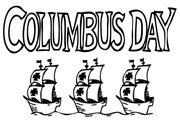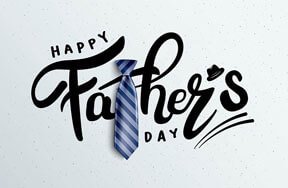Get ready to discover a whole "new world" of information about the navigator Christopher Columbus, and the American holiday named after him - Columbus Day. In the United States, Columbus Day is always celebrated on the second Monday in October. This year Columbus Day is celebrated on October 10th, 2016.
The first Columbus Day was celebrated in New York in 1792 to commemorate the 300th anniversary of Columbus’ historic arrival.
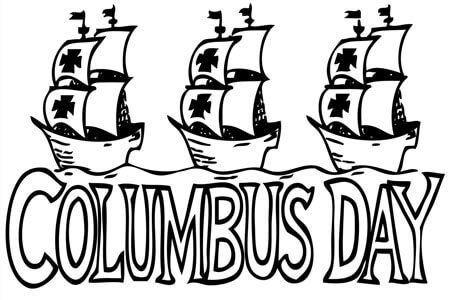 Columbus Day
Columbus Day
Why Is Columbus Day Celebrated?
“In fourteen hundred ninety-two, Columbus sailed the ocean blue … "
On October 12, 1492, the Italian seaman Christopher Columbus first stepped foot on the soil of the Americas, bringing with him European culture, goods, religion and practices. While other Europeans and Asians had arrived in the “New World” before him, Columbus publicized his discoveries throughout Europe, which spurred a wave of exploration and expansion throughout the Americas.
Ironically, Columbus did not plan on discovering a “New World”. He left Iberia with the blessing (and financing) of King Ferdinand and Queen Isabella of Spain, hoping to arrive in the Indies, a series of islands in South East Asia that Spain frequently traded with through long and expensive journeys on land. His goal was to find a quicker, water-based route instead.
But what Columbus wasn't aware of was the existence of the land masses of North and South America. So when he sailed west, he didn't land in the Indies, but rather he anchored in the Bahamas at a place he named “San Salvador”. When he came ashore on San Salvador, he mistook the native people for natives of India, calling them Indians, a misnomer which stands to this day. In fact, Columbus returned to the Americas three more times over the course of 12 years without knowing that he had arrived in an uncharted land, halfway around the globe from his intended destination!
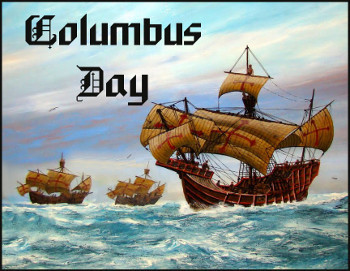 Columbus sailed to the Americas by accident
Columbus sailed to the Americas by accident
Columbus Day is marked as a national holiday in the United States, with most banks, some financial markets, federal agencies such as the US Postal Service, most state government offices, and many school districts closed for the day. It is celebrated throughout the Americas (North America, Central America and South America) on the same day, although the celebration, and its reasons, varies widely.
For example, in Hawaii, it is Discoverer’s Day, combining Christopher Columbus’s explorations with those of Captain James Cook, who charted the Hawaiian Islands and celebrated the ancient people and their culture. In most states in the U.S., Columbus Day is met with parades and salutes to Italian American Culture.
In Canada, Columbus Day is celebrated in conjunction with Thanksgiving. In most of Latin America, the Día de la Raza ("Day of the Race") celebrates the first encounter between indigenous people and Europeans. In Venezuela, the day is now known as "Día de la Resistencia Indígena" ("Day of Indigenous Resistance").
 Columbus Day is a celebration of Italian culture in some cities
Columbus Day is a celebration of Italian culture in some cities
Columbus: Explorer or Exploiter?
Many parents remember their lessons about Columbus from grade school. The teachers told us: “In 1492, Christopher Columbus discovered America.” That is, of course politically and technically incorrect, as native cultures had already been thriving for centuries by the time Columbus's three ships arrived from Europe. A more accurate way of explaining it to children would be to say that "In 1492, Christopher Columbus had his first encounter with the Americas."
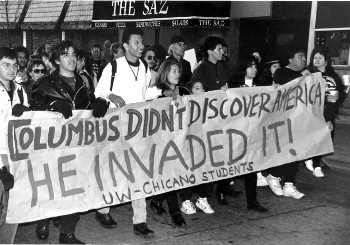 Columbus was not actually the first person to find AmericaCourtesy of feminspire.com
Columbus was not actually the first person to find AmericaCourtesy of feminspire.com
It would even be wrong to say that he was the first European to discover America, as Leif Eriksson and others had been there before him as well. The arrival of the Niña, the Pinta and the Santa Maria, marked the beginning of oppression and cruelty to the native people. Because of this, Columbus Day is also met with great protest throughout the Americas. Those opposing the day take the opportunity to reveal the unpleasant treatment that some European settlers subjected upon the indigenous people, including mass religious conversions and genocide.
For many in the United States, the celebration been refocused as a celebration of Italian American culture, particularly in areas with a high concentration of people with Italian lineage. This transition officially began in New York in 1866 and San Francisco in 1869, and has spread to Boston and other large cities. This has resulted in Italian-American themed celebrations, parades, and events.
Have Your Say
Did you learn about Christopher Columbus in school? What do you know about him?





























